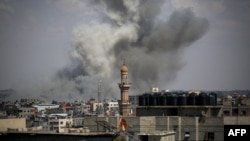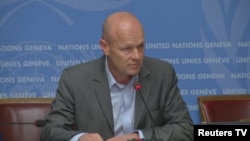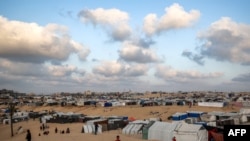Israeli military took over the border crossing after they had pushed into the southern Gazan town on Monday. Prior to that, residents of the Palestinian enclave experienced a night of airstrikes by the Middle Eastern nation.
While Israel executed its offensive in Rafah, Egyptian and Qatari mediators struggled to secure a cease-fire agreement between the Middle Eastern nation and its Hamas foes.
Hamas on Monday agreed to the cease-fire proposals, but Israel said the terms did not meet its demands.
After occupying Rafah border crossing, Israeli authorities denied the U.N. from entering the aid access points for Gazans, the international body said.
Jens Laerke, the spokesperson for the U.N.'s humanitarian agency OCHA, said there was only a one-day buffer of fuel to run humanitarian operations inside Gaza.
"We currently do not have any physical presence at the Rafah crossing as our access... has been denied by COGAT," Laerke said, referring to the Israeli agency that oversees supplies into the Palestinian territories.
"We have been told there will be no crossings of personnel or goods in or out for the time being. That has a massive impact on how much stock do we have,” the U.N. authority said, adding, "there's a very, very short buffer of one day of fuel available. As fuel only comes in through Rafah, the one-day buffer is for the entire operation in Gaza."
Laerke warned that if no fuel is delivered to Gaza, "it would be a very effective way of putting the humanitarian operation in its grave."
"Currently, the two main arteries for getting aid into Gaza are currently choked off," he said, referring to the Rafah crossing from Egypt and the Kerem Shalom crossing from Israel.
While international bodies expressed concern over the plight of civilians crammed into Rafah, Israeli tanks continued its military operation in the area.
On Tuesday morning, people searched for bodies under the rubble of wrecked buildings. One corpse was taken away for burial, wrapped in a white shroud.
Raed al-Derby said his wife and children had been killed.
Standing in the street, anguish etched on his face, he told Reuters: "We're patient and we will remain steadfast on this land.. We are waiting for liberation and this battle will be for liberation, God willing."
More than one million people have sought refuge in Rafah, living in tented camps and makeshift shelters. Many are trying to leave, heeding Israeli orders for them to evacuate, but with large areas of the coastal enclave already laid to waste, they say they have nowhere safe to go to.
The Israeli military said a limited operation in Rafah was meant to kill fighters and dismantle infrastructure used by Hamas, which governs the besieged Palestinian territory.
Speaking to reporters on Tuesday, Josep Borrell, the European Union’s foreign policy chief said Israel’s operation in Rafah “is going to cause again a lot of casualties, civilian casualties.”
"There are no safe zones in Gaza," Borrell added.
Israel has for weeks threatened to mount a major incursion in Rafah, which it says harbors thousands of Hamas fighters and potentially dozens of hostages.
Victory over Hamas is impossible without taking Rafah, Israeli authorities say.
A total of 34,789 Palestinians, most of them civilians, have been now killed in the conflict, according to Gaza’s health ministry.
Fighting between Israel and Hamas started on October 7 after the militant group killed at least 1,200 people and abducted 250 others in the Middle Eastern nation.
133 hostages are believed to remain in captivity in Gaza, according to Israeli tallies.
Information for this article was sourced from Reuters and Agence France-Presse.



Forum